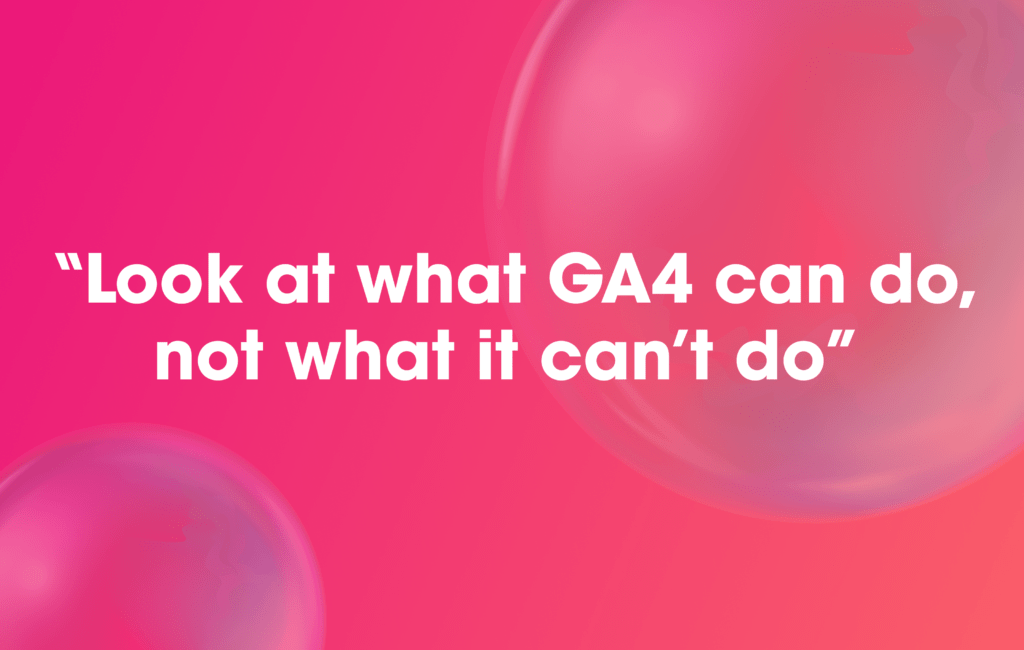It’s now been over 3 months since our old friend Universal Analytics (UA3) stopped processing data (c. October 2023) and the clock is now ticking down yet again.
On July 1st, 2024, UA3 will shut down completely. Not only will you have no new data flowing in, but your historic data will be lost forever. You need to get it downloaded, get it exported in your favourite format, or otherwise preserve it before it’s gone!

In a sense, right now we’re in the calm before the storm. UA3 has technically already wrapped up, but we’re still in the grace period extended to us by Google. A phasing out process, if you will.
However (and at the risk of mixing our metaphors!), we’re now standing on the edge of a precipice. Many people don’t realise quite how monumental the upcoming shift is going to be… and our fear is that those people are going to pay the price for being ill-prepared.
Our unique relationship with Google has enabled us to support our partners with the ongoing situation. We have previously communicated relevant updates – like the incoming cookieless future – right here on the Soapbox. But rest assured, our in-house data science team hasn’t been idle, so we’re now back with another review!
Join us while we think about what the future is going to look like: both short and long term.
Out with the Old, In with the New
As we’ve already said, we’re long past the sunset date of UA3, and many people have found the shift to Google Analytics 4 (GA4) to be a challenge. Ideally, you’ll already have GA4 running. If you don’t, then don’t worry, as we can help you to set up GA4, and also get you up to speed with the changes.
Some of the most common challenges that we’ve noticed users facing include:
- Tracking Revenue – there’s no getting around it; this has changed. It’s not like-for-like, but it’s worth saying that it was dependent on things like site structure anyway. Essentially, it was always difficult to put a monetary value on certain things, so even UA3 wasn’t perfect. Our advice is simply to dig into GA4’s new way of doing things, and recognise the pros as well as the cons.
- Sessions > Users – UA3 focused on sessions, whereas GA4 wants to focus on users. We’ve encountered many people who are also confused by the new metrics of “first user source” and “session source”. It’s true that there has been a fundamental switch in the core principle of tracking, but this switch is what enables us to now see lifetime value: a much fuller picture.
- Assisted Data Has Gone – we used to love these reports, but even we can’t deny that they had their problems (they were on a different API, and credit for transactions was assigned differently in different reports, etc). Once again, there’s no sense in looking back. We simply have to adapt to the new reports!
- Loss of Favourite Reports – talking about new reports! People with existing knowledge of UA3 tend to find that they can’t set up GA4 and instantly find their favourite reports. However, truth be told you shouldn’t even be looking for like-for-like, as that’s holding onto the past (despite it not being possible to do so anyway). The advice of our ever-wise Marketing Director is to…

Now, you may be sitting there thinking that we sound a bit unsympathetic, constantly telling you to let go of your tried and tested way of doing things. However, we’ve yet to touch upon the biggest change that you need to get to grips with, and the reason why there’s no going back.
The biggest change is actually the reason for the change from UA3 to GA4, and it will transform marketing practice.
Up until now, traditional tracking methods have revolved around the use of cookies, but the arrival of GA4 ushered in something new. Gone is the focus on session-based metrics; a focus on users is now the order. The transition to GA4 has often prompted resistance, but what’s not widely understood is that GA4 has not been brought in to spoil everyone’s fun. The truth is that third party cookies are on the way out, and so GA4 is essentially riding to the rescue to fill the cavernous gap in targeting that will be left behind.
This rescue couldn’t have been more timely, as Google has already started to remove the functionality of third party cookies on Chrome. The rollout is ongoing, and there’s no stopping it. And make no mistake; this is a monumental shift.
How to Be an Ethical Marketer…
The downfall of third-party cookies was always going to be inevitable because of the world we now live in.
Think about it. Millennials, once a generation for the future, are now very much a generation of the present. They have literally grown up with the internet. For the first time, a huge proportion of adult society has years – perhaps even a decade or two – of user data. This means that people’s user data is becoming ever more potent, and so the inevitable focus upon stricter privacy was… well… inevitable.
You may not have realised, but UA3 was quite literally banned in certain EU countries, largely due to cookie scepticism and growing concerns over intrusive tracking.
The strain upon UA3 was therefore already beginning to show and, despite all of the nostalgia that might be attached to it now, it simply couldn’t continue.
It’s also not the first big paradigm shift along these lines that we’ve seen.
We’re only a couple of years down the road from the arrival of iOS14, and that changed Facebook tracking forever. Many sites were suddenly blocked and unable to be tracked, which resulted in more limited Facebook targeting than ever before. It’s also resulted in ad revenue dropping. For marketers like us, that was painful to come to terms with, but come to terms with it we did. And in the post-Cambridge Analytica data scandal world, there’s simply no getting around the fact that it had to happen.
Now, it’s the turn of Google Analytics.
Challenges

Everyone who accesses a website that’s feeding into a GA4 data stream gets a user ID that will last for 14 months. That’s still going to enable plenty of data tracking. However, if you’re carrying out any activity that’s not Google-owned (e.g. paid social) then you’re soon going to have big problems. This is because any activity like this will soon fall under the umbrella of a “third-party cookie”.
Many people think that the arrival of more privacy-conscious measures is a universal positive. In many ways, it is a huge plus, but it’s not without problems. Sure, some businesses won’t be able to get their hands on your data, but it will also mean that you’re liable to get battered by increasingly untargeted ads.
Think about it:
- Google Chrome, the most popular browser, is dispensing with third-party cookies entirely. That means less data tracking, so potentially more ads that aren’t specifically matched to you.
- Google Ads is set to remove audiences in the very near future. That means that a lot of remarketing will die. To some, that will be a relief, but maybe those people will think again when the ads that they see don’t match their preferences.
- YouTube – the second most trafficked search engine – is owned by Google. We’ve already seen instances where the ad block on Chrome has reduced functionality on Youtube. What does that mean? You guessed it; more ads. Probably untargeted ones.
- Facebook, another popular “search engine”, doesn’t actually have a browser at all, but instead they do their utmost to keep you on their newsfeed. Their algorithm now actually limits the reach of posts with links, so you won’t see them as often (this is why links are often posted in the first comment!). Instead, you’ll see ads, but they may not be as relevant as they once were.
An important thing that we’re trying to highlight is that everyone is doing things differently.
We’re heading into a world where not only search engines are at war, but browsers are at war too.
Opportunities
At this point, you might be tempted to give up on the whole shebang, but don’t despair! With all of this focus on privacy, first-party data is the new currency. You simply need to know how to get the most out of what we do have, rather than burying your head and mourning the loss of what we used to have. We’re all in the same boat, and there are going to be plenty of opportunities. We’ll leave you with 3…
- Customer Retention – gaining new customers is great, but going forward we urge you to focus especially hard upon retention. Handling your customer’s data in a respectful manner shows transparency and trustworthiness. Both are great for building up brand loyalty. Satisfied customers will not only keep returning for services but also champion your brand via User Generated Content (UGC), which brings about all sorts of benefits. Too many businesses fall into the trap of relentlessly pushing for more to the point that they almost end up “abusing” their advocates. Just look at the troubled story of Bud Lite to see the damage that even a successful brand can do to itself. Always guard your brand, and never do anything to divide your user base. Take the time to understand who your demographic is, and then don’t let them go.
- Leave Behind the Binary – attribution models are never going to be the same, and we all need to get away from the stock attribution models that we’ve been attached to for too long. Nothing is binary in business and marketing. Once upon a time, people just looked at last click attribution models for PPC. Then, we all learned to take more notice of assisted conversions too. Now, we need to evolve again and look at the cost of acquiring users. This means leveraging the metrics like Session APRU and Lifetime Value ARPU that GA4 can give us. Embrace the opportunity to do things differently; you won’t regret it!
- Diversify – As browsers and platforms diversify their approaches, you should do the same. Take every opportunity to connect with your users. We’re at a unique point in history where multiple generations have grown up with and aren’t divided by technology, although they are separated by how they use that technology. The new blood doesn’t use Facebook, but prefers Tiktok; the old hands might pay more attention to TV ads. Streaming via platforms like Twitch, and making connections via schemes like Patreon, are commonplace. Everyone wants to be heard, so meet them at a place where you can listen!
So, get your UA3 data preserved, and make sure that – in this world of less control and less visibility – you’re not losing more than you need to. But as you do that, consider that a good 2+ years of that historic data was probably pretty unhelpful. Why do we say this? Well, because COVID-19 changed user habits beyond all recognition, so the resulting UA3 data often has surprisingly little value when you’re trying to use it contextually and comparatively.
In a sense, maybe it’s not such a bad thing that we’re all starting from scratch!
Finally, we’d also like to say that marketing hasn’t changed. Well, it has, because this entire blog has talked about how it’s changing, but the core goal of marketing and advertising is to tell other people’s stories. That essence is still intact.
Marketing is one of the oldest professions in the world. If all marketing and advertising wrapped up right now, how on earth would anyone find the services they need?! We’re all looking to market our brands, so we need to keep on telling our stories in a way that respects and unites our users. And if you have a need to partner with someone to guide your own efforts to greater success, you know where we are.
